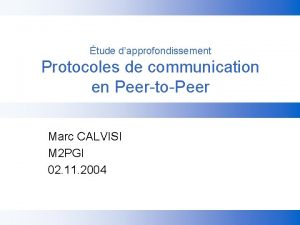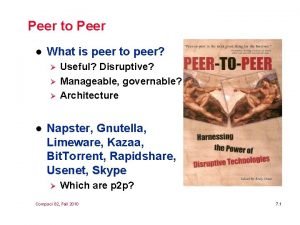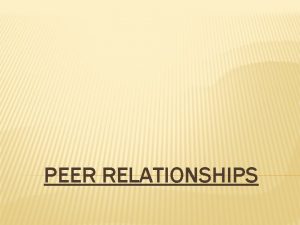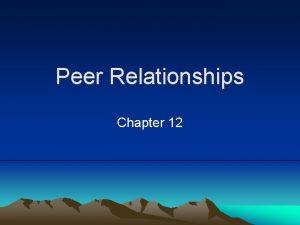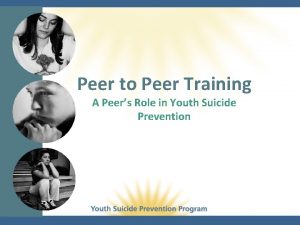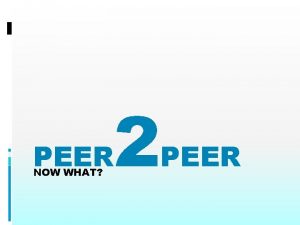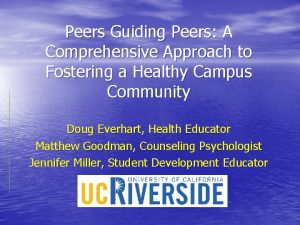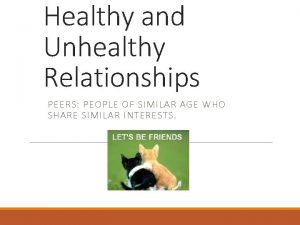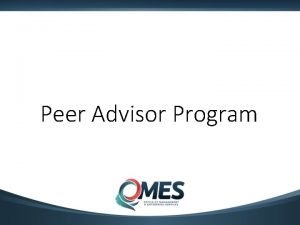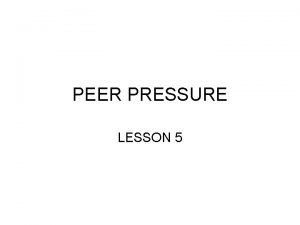Peer Relationships Who Are Your Peers PEERS people












- Slides: 12

Peer Relationships

Who Are Your Peers � PEERS- people close to you in age who are a lot like you. � May be classmates, neighbors, friends, teammates. � May also be an ACQUAINTANCE- someone you see occasionally or know casually. � You may have never meet them but you have something in common.

Friendships During the Teen Years � FRIENDSHIP- is a relationship with someone you know, trust, and regard with affection. � Usually begin with a common interest. � Peers are those around you, friends are those you choose to build relationships with.

What Makes a Good Friend � RELIABLE- trustworthy and dependable. � › Stick together through good and bad. › Respect and honor each others values, beliefs and differences. › You do what you say you will do. › Do not talk negatively to others about friends. � Shared Values › You value the same things LOYAL- faithful � Caring › Shown by being interested in the other person › Is a good listener and pays attention.

What Makes a Good Friend � SYMPATHETICaware of how others may be feeling at a given moment. › Understand respect how others are feeling � Trust › Proven through reliability and loyalty. � Respect › Has self respect and respect for others. › Also show respect for each others values and differences › Give time and attention to each other

Making New Friends � Most common places to meet friends for preteens and teens are › School › Neighborhood › Shared activities � Challenges to making fiends › Moving › Changing grades › Changing schools

Making New Friends � Be yourself � › Identify your values and beliefs and interest. � Break the ice › Start a conversation with a compliment or question › If you share the same interest it may be a good start. Seek out teens who share your interests › Join clubs, sports, community groups � Join a group that works for a cause you support › Will also show citizenship to others › Will also help your community

Strengthening Friendships � Spend time together � › The more time you spend the better you get to know someone › Participate in common interests � Communicate openly and honestly › Builds trust and respect Help each other through hard times › Be supportive and sympathetic › Don’t just hang around during the good times � Respect each others differences › Not everyone is exactly alike.

Strengthening Friendships � Encourage each other to reach goals › Be giving in your time and attention › Be supportive � Identify problems and work to solve them › Problems one friend has �Another point of view may be helpful › Problems between friends �Use good communication skills �Be honest and truthful

Peer Pressure � PEER PRESSURE- the influence that your peer group has on you. � Influence can be direct or indirect � Indirect is what you see your peers doing and want to do it as well. No one is forcing you. � Direct is when someone tells you what you should do to fit in.

Positive and Negative Peer Pressure � Positive peer pressure helps you make healthy choices in all three aspects of health. › Examples? � Negative peer pressure may make unhealthy or unsafe choices. › May pressure you to do something you do not want to. › The choice is your to make. � Encouraging someone to do something harmful or illegal. › Dares, threats, teasing, name calling

Resisting Negative Peer Pressure � Use H. E. L. P. (Healthful, Ethical, Legal, Parent Approved) › If what is suggested does not meet help refuse � Ways to resist › Avoid the situation › Use ASSERTIVE RESPONSES- state your position strongly and confidently �Say no. › Focus on the issue �Give reasons for your choice, avoid trading insults. › Walk away
 Mikael ferm
Mikael ferm Annotazioni sulla verifica effettuata peer to peer
Annotazioni sulla verifica effettuata peer to peer Peer-to-peer
Peer-to-peer Peer to peer transactional replication
Peer to peer transactional replication Peer to peer transactional replication
Peer to peer transactional replication Konsep dasar jaringan komputer
Konsep dasar jaringan komputer Esempio registro peer to peer compilato
Esempio registro peer to peer compilato Esempi di peer to peer compilati scuola primaria
Esempi di peer to peer compilati scuola primaria Relazione finale docente tutor compilata
Relazione finale docente tutor compilata Peer to peer l
Peer to peer l Peer to peer merupakan jenis jaringan… *
Peer to peer merupakan jenis jaringan… * Bitcoin: a peer-to-peer electronic cash system
Bitcoin: a peer-to-peer electronic cash system Features of peer to peer network and client server network
Features of peer to peer network and client server network


